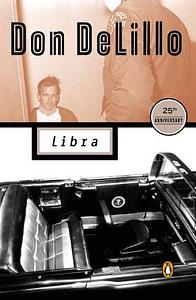Take a photo of a barcode or cover
challenging
dark
emotional
informative
mysterious
reflective
sad
tense
slow-paced
Plot or Character Driven:
A mix
Strong character development:
Complicated
Loveable characters:
Complicated
Diverse cast of characters:
Yes
Flaws of characters a main focus:
Yes
A book about the JFK conspiracy...but that's not really at all what it's about. DeLillo uses a high-profile, well-known example as the foreground to his evaluation of the American obsession with media. From the introduction, he asserts again and again how we no longer truly study events, or remember locations, or have experiences as a people. Rather we study, remember, experience representations of events, locations, experiences. Whether through our own cameras or vicariously through others' lenses, our memories and collective understanding are shaped by the precise moment in which a picture was taken, a motorcade was filmed, or a children's production captured on a mobile phone. Think about it. When was the last time you went to a major event, even if its just an ordinary event without lasting impact: a presidential visit, the changing of the guard in London, even a high school graduation. Now think about how many people were actually watching, experiencing the event, versus the number of people seeing it only through camcorders, iPhones, or worst-of-all iPads lifted up in the air. We become so obsessed with capturing our experiences for others, that we often lose the ability to experience them for ourselves. Now realize that DeLillo wrote Libra long before iPhones and iPads...and he writes about an event even several decades further in the past. The irony is that, even with all the videos, pictures, and "information" that we have about the days surrounding JFK's assassination, we are no closer to understanding what really happened. Certainly makes you re-think how you capture and experience memories.
Enjoyed, although not what I expected. The Oswald and Mackey characters are self-contained and fascinating. Some others, like Everett, become a little too well-trodden for me. The fractured quality of the assassination scene is fabulous. Once the myth has been deflated and brought down to size, it's a sad book.
challenging
dark
emotional
informative
reflective
sad
slow-paced
challenging
dark
slow-paced
Plot or Character Driven:
Character
Strong character development:
Complicated
Loveable characters:
No
Diverse cast of characters:
No
Flaws of characters a main focus:
Yes
For a book that blends elements of fiction and conspiracy surrounding a real life event, its hard to express how real so much of Libra feels. The power of misinformation is the ability of a good writer or orator to present a narrative constructed from fact that is patched together into something fictional, a story with an agenda. I think DeLillo intentionally veers into this by using real characters, real dates, and real places that lead to a real historical event but cutting the facts with speculation, uncertainty, and conspiracy. Libra is not an easy read, and a lot of the time it wasn’t particularly enjoyable for me, but it *was* pertinent. Three stars. ⭐️⭐️⭐️
Interesting, but I couldn't get into the style. It never flowed for me.
adventurous
challenging
dark
informative
mysterious
reflective
medium-paced
Plot or Character Driven:
A mix
Strong character development:
Yes
Loveable characters:
No
Diverse cast of characters:
Yes
Flaws of characters a main focus:
Yes
Of all of the conspiracy theories I’ve found enthralling I’ve got to say the JFK assassination is not one of them. While the JFK assassination is a landmark event in the course of American history that truly shows the turning point in public perception and distrust of the government, I don’t find the actual event to be that interesting of a subject. Much of this has to do with the fact that so many people have poked, prodded, and scrutinized any and all evidence for decades to little avail. It is unlikely that we will ever know the truth and yet the great authors of the late 20th century such as Stephen King, Norman Mailer, and Don Delillo with ample amounts of information to go off of, decided to write novels on the subject, all of which were published before I was even born.
I think it is for this reason that this subject has been so exhausted in my eyes. For longer than I’ve been alive people have treated this event as if it holds the secrets to the universe and to someone living in the 21st Century, conspiracies around 9/11, QAnon, and Jeffery Epstein offer so much more relevance and intrigue in exploring their subject matter.
The main reason I read Libra was more so to continue on my path of exploring the works of Don Delillo. Having read White Noise a few years back this was my second venture into his bibliography. While I didn’t love White Noise I did enjoy it and was interested in seeing what else Delillo was capable of. While I still found a lot to like and appreciate here I honestly found this work taxing and lackluster at times.
I think reading Libra solidified my opinion on Delillo as not an author for me. As someone who likes a lot of his contemporaries, I’ve found his prose to be rather straight laced and lacking, heavy in details and little in intrigue. There will be an occasional passage where I find the prose engaging and I do think he can build scenes and characters but as a whole I was losing interest more than I was being drawn in.
Where Delillo really shines as a writer is how he structures his novels. This story is told from many perspectives alternating initially between the life of Lee Harvey Oswald growing up and CIA directives piecing together the evidence of the events sometime in the 1980s, adding in more characters and plots as the narrative progresses. I think this was a really interesting way to tell this story and one that really lends itself to portraying the many treads, multiple narratives, and possible culprits attached to this case. It definitely adds a level of intentional confusion that I can appreciate but maybe not really enjoy reading on this initial passing.
Usually with these heavily researched, deep dive subject novels I feel compelled to do some extracurricular research on the subject myself. This is not an obligation but an added pleasure of spending so much time on any given subject. That was not the case here. Maybe it was my aforementioned malaise with the subject matter but I had no desire to learn further, even if it would have helped and enhanced my reading experience. Genuinely I just didn’t find Delillo’s portrayal of events compelling enough to dig further.
That is not to say I didn’t find this narrative enjoyable to follow to some degree, just that I don’t feel like he pushed beyond what he portrayed here. This novel definitely bases its enjoyment off of how familiar you are with the subject prior, I just also felt no real push by the author to get me to that level.
It is clear how well researched this novel is and I do respect that but it is almost to a fault. While reading the chapter covering the proceeding cavalcade prior to the shooting it felt as if Delillo had just watched the iconic footage and was making the painstaking effort to describe that footage in its strictest detail. Too often I felt this narrative was bogged down by the facts and evidence, highly familiar with most, to actually have the space to explore the unknown around the subject and the parts that did wander felt restricted by this over looming air of accuracy. This level of reverence to the subject matter is understandable and admirable but it also just doesn’t make for a fun or interesting read, at least in my eyes.
The sections I found most interesting from a writing standpoint were the chapters centering Oswald. This really is a book centered around him. These chapters that explore him as a person and his character are where Delillo showcases his creativity best. I found these the most engaging sections and most interesting to meditate on.
This was an interesting experience in exploring the work of Don Delillo but as it stands I have little interest in exploring further. There are a few of his earlier novels from the 70s that I’d like to read but as it stands with his later works I’d need a strong reason to want to take them on at this point. Many of these prose style issues I have were apparent in White Noise but with a work like that I felt there was more room to be imaginative and craft something new.
The best DeLillo novels are a tad bit frightening sprinkled with sentences and thoughts that cause me to pause, sigh, and get lost. “Libra” reminds me of all the reasons I love DeLillo.



